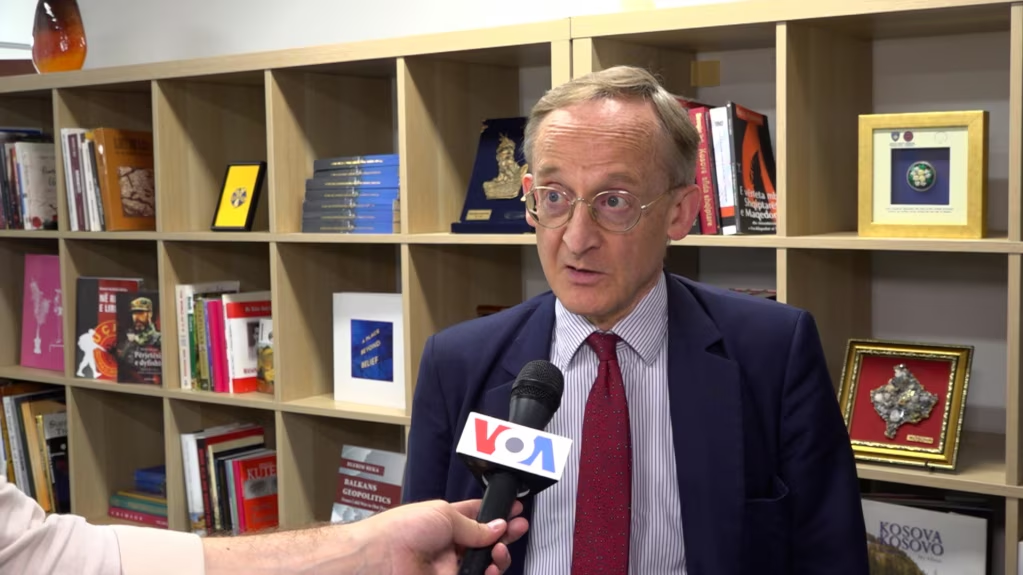A day ago, the documentary film “Gratitude” was shown at the Consulate of Kosovo in New York, dedicated to the contribution of British historian Noel Malcolm to the world’s awareness of the truth of Kosovo’s history.
The author of the book published in 1998 “Kosova: A Short History” was present at this gathering.
In an interview with journalist Burim Goxhuli, the well-known British historian commented on the process of normalizing relations between Kosovo and Serbia, the creation of the Association of municipalities with a Serbian majority and the new conditions of some Western countries for Kosovo’s membership in the Council of Europe.
The well-known British historian, Sir Noel Malcolm criticized the representatives of the European Union for the pressure on Kosovo and, as he said, the continuous concessions to Serbia in the process of normalizing relations between the two countries.
“The main responsibility falls on Belgrade, which I think has continuously shown bad intentions. The second responsibility is the European Union, its representatives and mediators, who have constantly made concessions to the Serbian side in an unprecedented way, which sometimes I think raises serious questions about not only the impartiality of this process, but also its validity based on international law,” says Mr. Malcolm for VOA.
According to Mr. Malcolm, making Kosovo’s membership in the Council of Europe conditional on the Association of Municipalities with a Serbian majority is an unfair approach that further complicates the reconciliation between Pristina and Belgrade.
“The way the representatives of the EU have tried to change their conditions, accepting the growing conditions of Serbia, is not a success story of international diplomacy, from the way they have tried to misuse this issue. The Government of Kosovo, from the beginning, from the Ahtisaari Plan, which is the foundation of Kosovo’s independence, has agreed to have an association of municipalities with a Serbian majority. But it is the conditions that have increased over the years that have made this issue increasingly problematic,” says Mr. Malcolm.
The issue of the Association is one of the hottest points in the talks on the normalization of relations between Kosovo and Serbia.
The representatives of the western countries have continuously criticized the government of Kosovo for not fulfilling the legal obligations arising from the negotiation process.
An agreement reached last year between the parties envisaged, among other things, that Prishtina would start work on the establishment of the Association, while Serbia would not oppose Kosovo’s membership in international organizations.
Belgrade has actively campaigned to prevent Kosovo’s membership in the Council of Europe, emphasizing the Association.
Several European countries such as France and Germany asked the government of Kosovo to take concrete steps for the establishment of the Association before membership.
However, the prime minister of Kosovo, Albin Kurti, described such a condition as unacceptable.
The Historian Malcolm says this stalemate creates opportunities for Moscow to destabilize the Balkans, particularly after the Russian attack on Ukraine.
“The war in Ukraine has worsened the geopolitical aspect of Europe and has had a negative impact on Kosovo as well. I’m sure people are more worried that Serbia could be some kind of Trojan horse in the Balkans, working for Moscow. This is understandable. But in the long term, I think the war in Ukraine will affect the West to understand who its real friends are. And we know that Kosovo and Albania are the most pro-Western, pro-NATO, pro-American countries in the entire region. These are the real friends, while Serbia is constantly showing that it is not a friend at all”, says the British historian for the Voice of America.
Serbia aspires to join the European Union but maintains strong ties with Russia and China. According to historian Malcolm, Belgrade’s actions are an indication that this country is closer to joining the ‘BRICS’ group consisting of Russia, China, India, Brazil and South Africa, than the European Union.
“It would be easy to say that (Serbian President Aleksandar) Vucic is playing a smart game. He knows what worries Berlin, Paris, Washington, and thus other concessions will be made to him. But it’s not just a tactic. See the results of the polls in Serbia. There is a broad public feeling that they love Putin more than any Western politician. The support for Putin in the Serbian polls is shocking,” he says.
Mr. Malcolm made these comments during an activity at the Kosovo Consulate in New York, where the documentary “Gratitude” dedicated to his contribution to Kosovo was shown, a three-part film made by the former ambassador of Albania to Britain, Mal Berisha.
Sir Noel Malcolm is the author of the book “Kosovo: A Short History”, which was published in 1998 and was one of the few books that told the history of Kosovo, at a time when it was not known by other countries.
“I thought to do it here as a very important sign of what Kosovo is. A Kosovo that so many years ago, before the war, was almost unknown here, while today it is a country that has representation in the United States of America and to do an activity with Sir Noel here, who has played a very important role great in the awareness of the international factor about the intervention in Kosovo, to save the Kosovars from the zebra hoof, for me it is something very meaningful”, says the author Berisha.
The Consul of Kosovo in New York, Blerim Reka, says that the book of the historian Malcolm helped raise awareness of the world diplomacy on the issue of Kosovo even after the liberation and independence of the country.
“In the year when it was published, the liberation war of Kosovo had begun, and this book completely changed the historiography of Serbia, which had been speculative and propagandistic until then, because it exposed Serbia’s false myths about Kosovo with facts. From his book, for these 24-25 years, a quarter of a century, not only world history but also world diplomacy found references, abundant arguments to prove why the liberation war in 1998 was necessary”, says Ambassador Reka.
Author Berisha says that the issue of Kosovo is not a closed chapter and that the engagement of all Albanian activists everywhere in the world is needed.
“Let’s work together to keep Kosovo strong the way we want it. Because in fact, the fall of Kosovo is a fall for every Albanian. It is not a decline for the citizens of Kosovo. It is a failure for the entire Albanian world”, says Mr. Berisha.
In 2016, Sir Noel Malcolm was honored by the state of Kosovo with the “Gold Medal of the League of Prizren” decoration.







